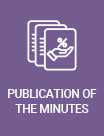Minutes of the latest meeting of the BDBR: these are the elements considered by the Board in their policy discussion
The Board of Directors of Banco de la República unanimously decided to raise the monetary policy interest rate 25 basis points (bp) to 13%.
In their policy discussion, the Board of Directors took the following factors into account:
- In February, the 13.3% annual inflation rose only 3 bps compared to what it was in January. This slowdown in price changes is partly due to the moderation of annual food price inflation, which was 24.1% in February and significantly lower than December's figure (27.8%). At the same time, pressures on costs are easing: international prices of food and other imported goods have been falling, and this has been reflected in progressive declines in producer price inflation (PPI). The annual increase of PPI went from 19.2% in December to 15.1% in February. These favorable signs suggest that the inflation rate is approaching its ceiling and, from this point, it will probably begin the expected decline for 2023.
- Inflation expectations are beginning to incorporate this positive news. This was shown by the results of the monthly survey of economic analysts done by Banco de la República in which the 12-month inflation expectation went from 7.7% in the January survey to 7.2% in March in the sample median. Something similar occurred with the corresponding 24-month expectation that went from 4.5% to 4.0%. To the extent that this reduction in inflation expectations consolidates and becomes widespread among the economy's price-setting agents, the price indexation phenomenon will begin to subside, thus facilitating the return of inflation to its target.
- The Economic Monitoring Indicator (EMI), which had been showing a slowdown since October, rose 5.8% in January, with improvements in secondary and tertiary activities. Due to the improvement in the economy in January compared to what had been forecast as well as the effect of a lower statistical base due to DANE's revision of the 2022 figures, the technical staff raised its GDP growth forecast for 2023 from 0.2% to 0.8%. In spite of this improvement in the forecast, economic activity continues to show a significant slowdown compared to its strength in 2022 as can be deduced from the fall in imports, lower housing starts, lower vehicle sales, weaker real manufacturing production, and reduced growth in the loan portfolio, among other things.
- Although recent financial stability problems in the United States and some European countries have generated nervousness and volatility in international markets, which has increased uncertainty about the trend of the world economy, their effects on the Colombian economy have been limited due to a well-regulated and supervised banking system that comfortably complies with Basel Committee standards.
In the context described above, the members of the Board of Directors unanimously agreed to increase the policy rate by 25 bp. They emphasized that inflation and the behavior of inflation expectations have moved in the desired direction. They agreed on the need to continue the upward cycle of the interest rate, although this time with a smaller increase, to ensure the return of inflation to the 3.0% target that the Board has proposed to achieve by the end of 2024. In their discussion, different opinions were expressed that gradually became closer until an agreement was reached that allowed for a unanimous decision.
Some Board Members reiterated that increases in monetary policy interest rates from 1.75% in September 2021 to 12.75% in January 2023 have moderated demand as illustrated by declines in the dollar value of imports since November as well as other demand indicators. In this regard, they noted that, although the EMI results for January were above expectations, the information obtained from meetings with businessmen and business opinion surveys suggested that it was unlikely that such a positive trend will continue in the coming months. They underscored the encouraging signs in terms of inflation despite the seasonal increase in education in February that was offset by the moderation of food price inflation and electricity tariffs. They added that consumer credit growth has been declining from rates near 23% per annum in the third quarter of 2022 to rates below 13% in mid-March. They stressed that, despite its volatility, the exchange rate has changed positively since the high levels in October 2022. With regard to risks, they underscored the 3-percentage point decrease in the TES interest rate since October, which reflects an improvement in the sense of confidence. This will probably be supported by the technical staff's perspective of a reduction of the external deficit in the current account of the balance of payments from 6.2% of GDP in 2022 to 4.0% of GDP in 2023 despite a significant drop in the prices of export commodities, particularly oil.
Other members of the Board noted that while there were encouraging signs of a slowdown in overall inflation, core inflation continued to persist under the pressure from price indexation effects. In addition, they stressed the fact that, although inflation expectations for one and two years in the future had declined between January and March, economic analysts' expectations for the end of 2023, as measured by the March survey of Banco de la República, had risen again. Should these expectations remain high, they could hinder the process of converging to the target within the established timeframe due to the specific importance that the year-end inflation figures have for adjustments to various prices and tariffs for the upcoming year. They added that signs of a smaller slowdown in economic activity could prolong the momentum of private consumption and delay the correction of excess demand. They noted that the economy has become more sensitive to external shocks and there is still a risk of high exchange rate volatility. This is even more likely given the prospect of lower oil prices. They emphasized the fact that, despite the expected progress in the adjustment of public finances, the pressure of the fiscal deficit on aggregate demand and the external imbalance persists. They reminded everyone that interest rate increases in developed economies reduce Colombia's competitiveness in the international capital market and, under such conditions, the need to consolidate the contractionary monetary policy stance must be stressed to ensure the desired disinflationary trajectory and reestablish macroeconomic equilibrium. They noted that credit continues to grow at faster rates than the broad monetary aggregates (M2 and M3). In this regard, they warned of the risk of slowing down policy rate adjustments should it be necessary to increase the policy rate at a later date.
The Board agreed that, although there were differing opinions, a 25-bp increase in the policy interest rate would address their main concerns, and therefore concluded that with this decision, monetary policy would continue to make progress towards its objective of bringing inflation to the 3.0% target. Subsequent decisions by the Board will depend on the new information available.














.png)

































